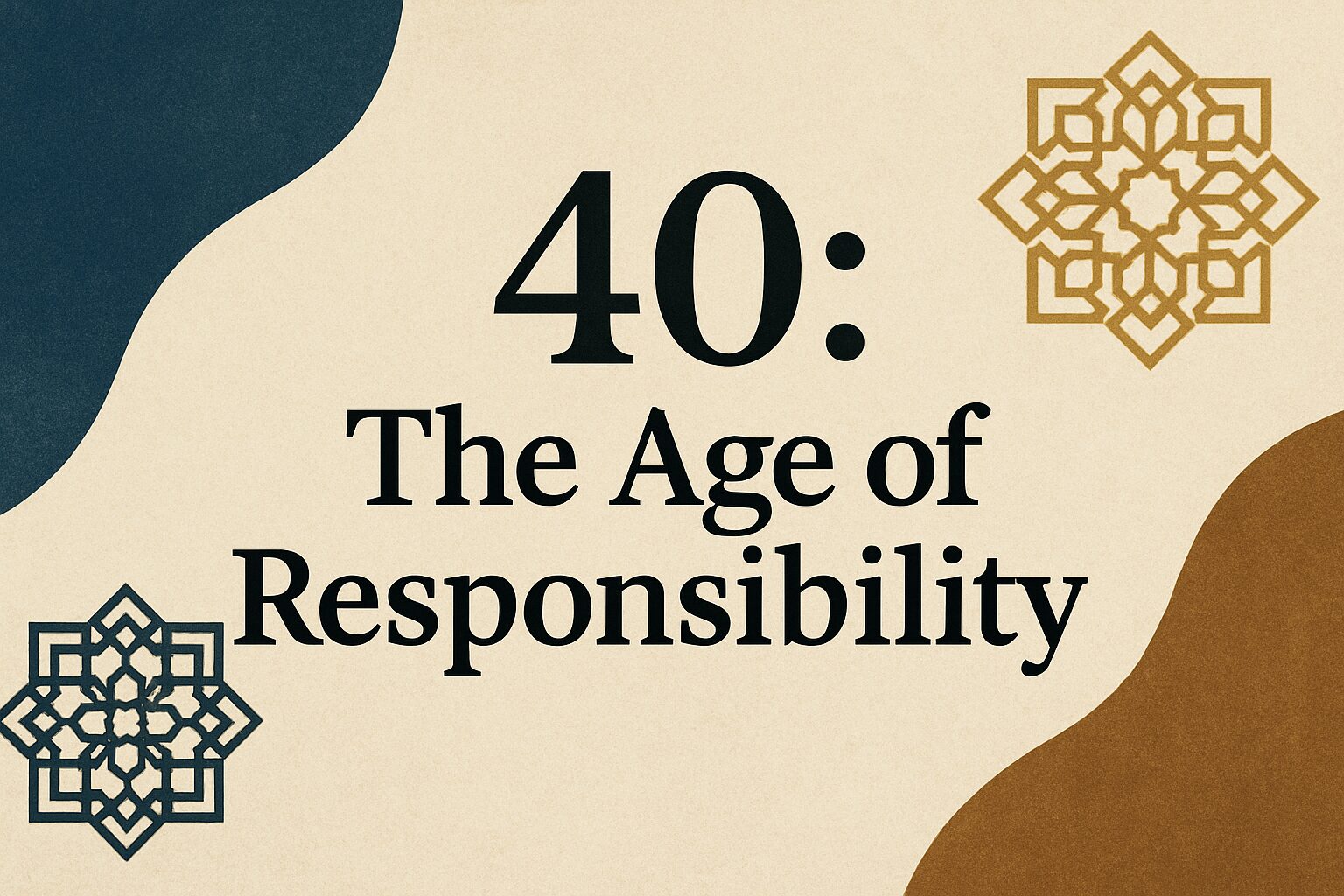Salaamun alaykum, dear readers!
Who does God count as disbelievers, according to the Quran? Is it simply someone who is not a Muslim?
No, the correct answer is that not all Jews, Christians, Hindus, polytheists, or atheists will be held accountable for being disbelievers according to the Quran. There are two primary factors listed in the Quran that will influence the fate of non-Muslims, both involving the mercy of God.
The Age of 40
Let’s first start with the age of accountability, the first factor. The Quran says that when a person has reached forty years of age, he should declare that he has become Muslim and repent to God for the sins committed before becoming 40 years old.
Therefore, one only starts being held accountable for their sins or for not having been Muslim until age 40, and that the first 40 years of one’s life is like a grace period to take the time to learn.
Rashad Khalifa himself, God’s Messenger of the Covenant, said in Appendix 32 of his Quran translation and in one of the Quranic study audios that the fact that everyone who dies before age 40 goes to Heaven is not his personal opinion and was a piece of information which God told him to convey.
- [46:15] And We have instructed the human being, regarding his parents, goodness. His mother carried him laboriously, and laid him down laboriously; his carriage and weaning is thirty months. Until when he reached his strength, and reached forty years, he said, “My Lord, enable me that I appreciate Your goodwill which You have bestowed upon me and upon my parents, and that I do as a righteous one that which You approve. And cause righteousness among my offspring for me. Indeed, I have repented to you, and indeed, I am among the Muslims.”
It is noted that when the Quran uses the words “until when (hatta idha) x happens, y happens” it usually means “it isn’t until x happens that y happens” or “y doesn’t happen until x happens”. That’s the Quran’s phraseology in the 25 occurrences of “until when x happens, y happens”.
One example is verse 27:84, where it said that “until when” (hatta idha) a group of people who denied God’s signs were summoned on Judgment Day, God asked them about such denial. It logically means that it wasn’t until the deniers were summoned, that God questioned them as such. Or in 23:99 where it said that until when death came to one of the disbelievers, he requested to God to give him a second chance, which logically means: it wasn’t until death came to him that he begged for a second chance.
Thus, verse 46:15 states that it isn’t until the person turns 40 years old that he is obligated to become Muslim and repent for his past deeds.
The first 40 years of one’s life is thus a trial-and-error period, or a grace period. One has until the age of 40 to both become Muslim and to start being held accountable for any sin that he or she commits; repentance and making the final decision to be Muslim becomes mandatory for those over the age 40.
God has designated the age of 40 as the age of accountability, not because people aren’t capable of consent or reason before that, but likely because it takes a long time for people (even those born in Muslim households) to escape cultural, environmental, and psychological barriers and make a truly informed decision to become a Muslim, rather than just following whatever their parents, relatives, and friends are doing without any solid understanding or conviction.
- The Quran in many places rejects the mentality of, “I just follow what my parents are doing,” and encourages people to escape their cultural and environmental biases to come to the truth. In a world where the supernatural is completely invisible and many ideologies claim different things about it, making a truly informed decision takes a lot of time, patience, and research, hence why the 40-year grace period is needed.
Personal Capacity Rule
It also happens to be the case that passing the age of 40 and being non-Muslim alone isn’t enough to be accountable for disbelieving either, according to the Quran. God does not assign anyone except their capacity, according to the Quran in multiple instances.
- [23:62] But We do not assign any self except its capacity; with Us is a book that talks with the truth, and they will not be wronged.
- [2:286] God does not assign any self except its capacity. For it is what it earned, and against it is what it earned…
One may call this the personal capacity rule. If it is in one’s personal capacity to open up one’s heart to the religion of Islam, or have access to accurate information regarding the religion, but they still reject, then they will be punished for being non-Muslim.
If it is not in one’s personal capacity open one’s heart to Islam, then one is not held accountable for it.
And Muslims should not think that conversion to Islam is easy. YOU think it is easy because you grew up with it, but not everyone is actually able to be sincere Muslims, and due to the personal capacity rule, God will not punish them for it.
Here are a snapshot of the various factors preventing people from accepting Islam:
- “It all sounds good, but pretty words are meaningless without evidence. How do I know that Muhammad isn’t a liar and that Buddha’s teachings about religion and gods are false? How do I know that Muhammad is correct and atheists are not correct?” (The 19-based mathematical miracle provides the conclusive evidence)
- “I just learned Muhammad married a 9-year old girl, ewwww, poor girl! She is a victim of a pervert! Why would I follow such a man?” (Aisha was 18 when she consummated her marriage according to various historical documents).
- “I want to follow a chill god who doesn’t punish non-worship, but rewards worshippers and good-doers, and punishes those who commit evil against others. The Quranic God is way too obsessed with wanting other people to worship Him, and way too obsessed with what other people do with their personal lives and that just doesn’t sit right with me!”
- “It is unjust for Allah to send someone to eternal torment and torture for something as minor as being non-Muslim or not worshipping Him. Maybe Allah is just an egotistic sadist!”
- “I gave birth to my children, but I don’t expect them to worship me or have a master-servant relationship with me, I just want them to be happy. Likewise, why would God be too obsessed with his creation worshipping Him?”
- “Why is alcohol and pork banned entirely? Anything in moderation and eaten properly can’t do harm to anyone, including pork, so I really don’t get it! Maybe Islam is just a bunch of nonsense packed into a book.”
- “Why are disbelievers, even the ones that are nice and peaceful and don’t harm anyone, treated like utter garbage in the Quran?”
- “I’m way too scared to abandon the religion of my parents, what if those gods are correct and Islam isn’t, I’ll surely be punished then!”
- “The religion of my parents and ancestors is way too ingrained into my identity, it feels too disorienting if I completely let go of it, as if I’m losing a part of myself.”
- “The Quran says Pharaoh died by drowning and his body is preserved today. If so, why does the Egyptian books of history not tell us about a pharaoh who died by drowning? Why do the books of Egyptian history or any non-Biblical documents about Egyptian history tell us about Moses? Maybe the Quran is lying to us and Moses never existed!”
So you can see why it’s not easy to convert to Islam, because it’s hard to provide satisfactory answers to most of these questions.
Most of the above arguments, except maybe 3 of them, are emotional and psychological doubts to the message of the Quran that are severely difficult for many people to get rid of. Only those who have the necessary capacity to get rid of those doubts, yet chooses not to do so, will be punished for not being Muslim.
Therefore, to be disbeliever when one is past the age of 40 would require a rejection of Islam that could have been avoided given the strength of the impact of societal conditioning, suppression of information from the authorities, intellectual deficiencies, whether you can read and write, the quality of the information one is given about the faith, whether one lives a busy life (thus having very little time to think deeply or research about these issues), and other physical and psychological factors.
Only God knows best about whether a person can be held responsible not for not having accepted Islam in their lifetimes given their personal circumstances, and to what degree they will be held responsible if so.
Let us think deeper about the impact of societal conditioning on one’s personal capacity to do this on a deeper level. The average person will have a difficult time understanding why or why not to change a lifelong habit that they see everyone else around them doing, unless someone or something makes them aware of a good reason to change the habit. It’s the same issue with changing religions, and here are some examples:
What do you think about vegetables? If most of your friends and family expressed a dislike for vegetables growing up, then it is very likely that you’re going to have a hard time escaping the social conditioning of disliking vegetables even if you happen to hear about their benefits from some health-conscious people “preaching” about it, or if you have an internet connection and can easily Google it.
Or the reverse, if you tell someone to stop eating vegetables and do the “carnivore diet” (eating only animal foods, no fruits and veggies) when she has been eating fruits and vegetables for her whole life, for example, you have to give her a good reason why she should stop eating vegetables, or else she will just continue to eat them. Lifelong habits and
Similarly, some cultures are perfectly comfortable eating insects as a protein source, yet our social conditioning causes us in the West to have revulsion at the thought of eating them.
Societal conditioning is very hard to escape, and that is true regarding religion. God does not assign any responsibility beyond one’s capacity (verse 2:286).
- This is why only the non-Muslims who have the mental capability to escape their societal conditioning and psychological barriers, and find Islam, but chose not to take any meaningful action towards doing so, will be held accountable for it.
If you still cannot understand the heavy psychological barrieers that a non-Muslim must overcome to convert, then you (as a born-and-raised Muslim) should ask yourself why you aren’t Hindus, Buddhists, Christians, Sikhs, and others?
- The same barriers preventing you from becoming atheist, Christian, or Buddhist right now are the same exact barriers preventing non-Muslims from converting to Islam. Only those who have the personal capacity for overcoming those barriers, but choose not to do so, will be held accountable for not being Muslim, because God does not assign anyone except its capacity according to verse 2:286.
Conclusion
There are two primary factors that influence the fate of a non-Muslim: whether he or she died before the age 40, and if they lived past age 40 but did not meet the personal capacity threshold to be held accountable for being non-Muslim based on their personal circumstances and intellectual capabilities.
God alone knows each individual the best, so He is the only one qualified to decide whether one has met the personal capacity threshold or not.


Leave a Reply